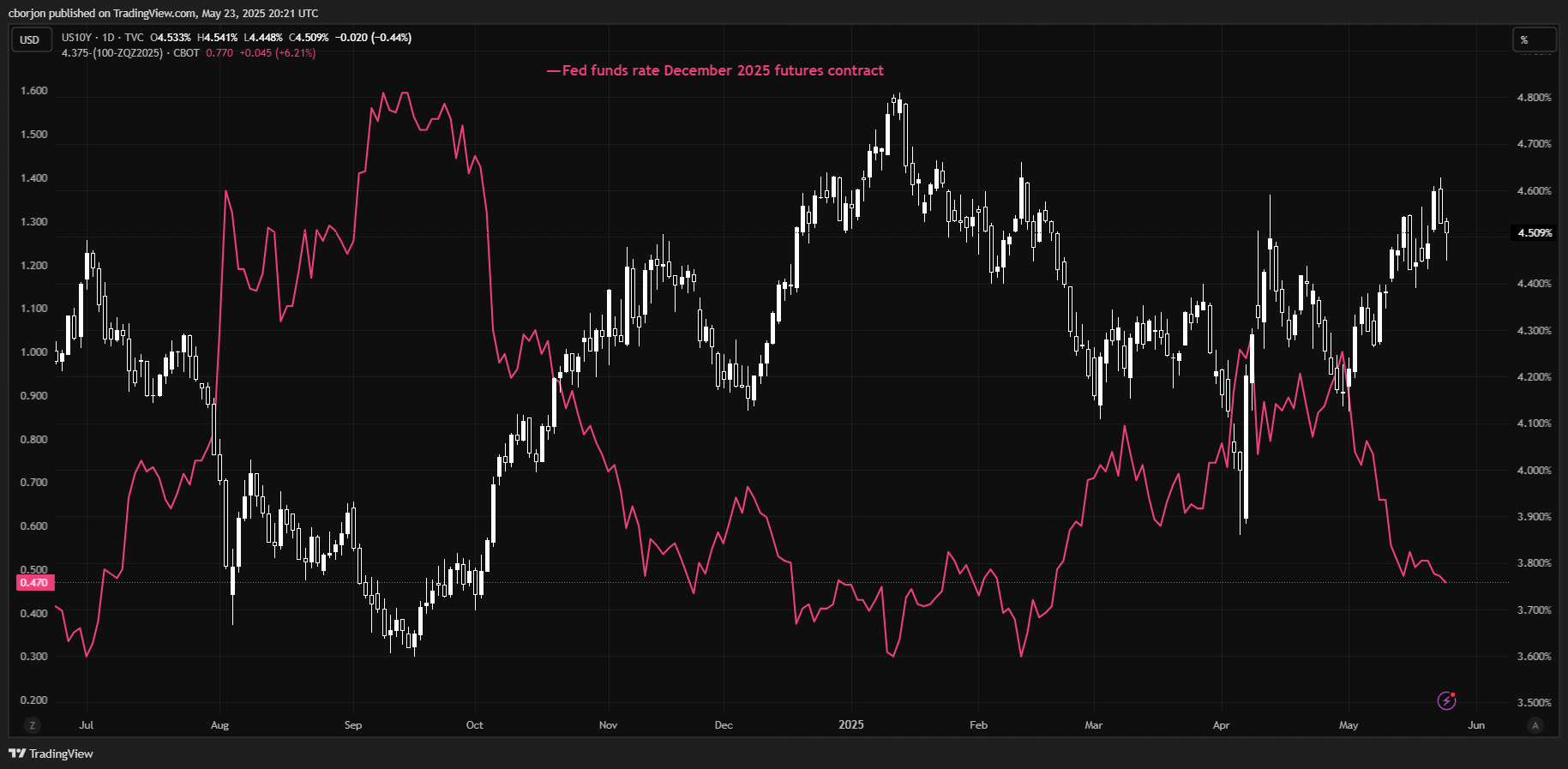US yields slide as Trump tariff threats rattle markets, fuel ‘Sell America’ trend
- 10-year yield falls to 4.51% as investors flee US assets amid rising protectionist risks.
- Trump targets iPhones made abroad and threatens 25% tariffs on Apple products.
- Moody’s downgrade, $3.8T tax bill, and EU trade tensions intensify fiscal and inflationary fears.
US Treasury yields fall across the whole curve following Trump’s threats to impose tariffs on Apple’s iPhones not manufactured in the US and duties on European imports. At the time of writing, the US 10-year Treasury note yield is down two basis points at 4.509%.
Treasury yields dip across the curve as Apple and EU tariff threats deepen concerns over trade war and US debt
Trump's tariff rhetoric weighed on US assets as the “sell America” trend strengthened. The trade war, which Trump initiated, and concerns about the US fiscal position sparked outflows of US equities, bonds, and the US Dollar.
The trade war escalation, now against Apple, a US-based company, rattled US equity indices, which remained pressured ahead of the Wall Street close. Trump is threatening Tim Cook’s company, saying that any iPhone sold in the US but not made in the country would have to pay 25% tariffs.
Furthermore, he escalated the already difficult discussions with the European Union, saying that he recommended 50% tariffs on EU’s imports beginning on June 1.
Yields on US bonds had retreated somewhat, following a spike sponsored by Moody’s downgrading the US debt, citing concerns of fiscal improvement and fears that inflation would remain higher due to tariffs.
In the meantime, the US House of Representatives passed Trump's tax bill, which is now on its way to the Senate to be discussed and voted on.
The bill would add close th $3.8 trillion to the already ballooning national debt. Meanwhile, the US 30-year Treasury bond yield rose above 5% due to the effects of a deterioration of the US fiscal outlook.
US 10-year yield vs. Fed funds rate December 2025 easing expectations

Interest rates FAQs
Interest rates are charged by financial institutions on loans to borrowers and are paid as interest to savers and depositors. They are influenced by base lending rates, which are set by central banks in response to changes in the economy. Central banks normally have a mandate to ensure price stability, which in most cases means targeting a core inflation rate of around 2%. If inflation falls below target the central bank may cut base lending rates, with a view to stimulating lending and boosting the economy. If inflation rises substantially above 2% it normally results in the central bank raising base lending rates in an attempt to lower inflation.
Higher interest rates generally help strengthen a country’s currency as they make it a more attractive place for global investors to park their money.
Higher interest rates overall weigh on the price of Gold because they increase the opportunity cost of holding Gold instead of investing in an interest-bearing asset or placing cash in the bank. If interest rates are high that usually pushes up the price of the US Dollar (USD), and since Gold is priced in Dollars, this has the effect of lowering the price of Gold.
The Fed funds rate is the overnight rate at which US banks lend to each other. It is the oft-quoted headline rate set by the Federal Reserve at its FOMC meetings. It is set as a range, for example 4.75%-5.00%, though the upper limit (in that case 5.00%) is the quoted figure. Market expectations for future Fed funds rate are tracked by the CME FedWatch tool, which shapes how many financial markets behave in anticipation of future Federal Reserve monetary policy decisions.
